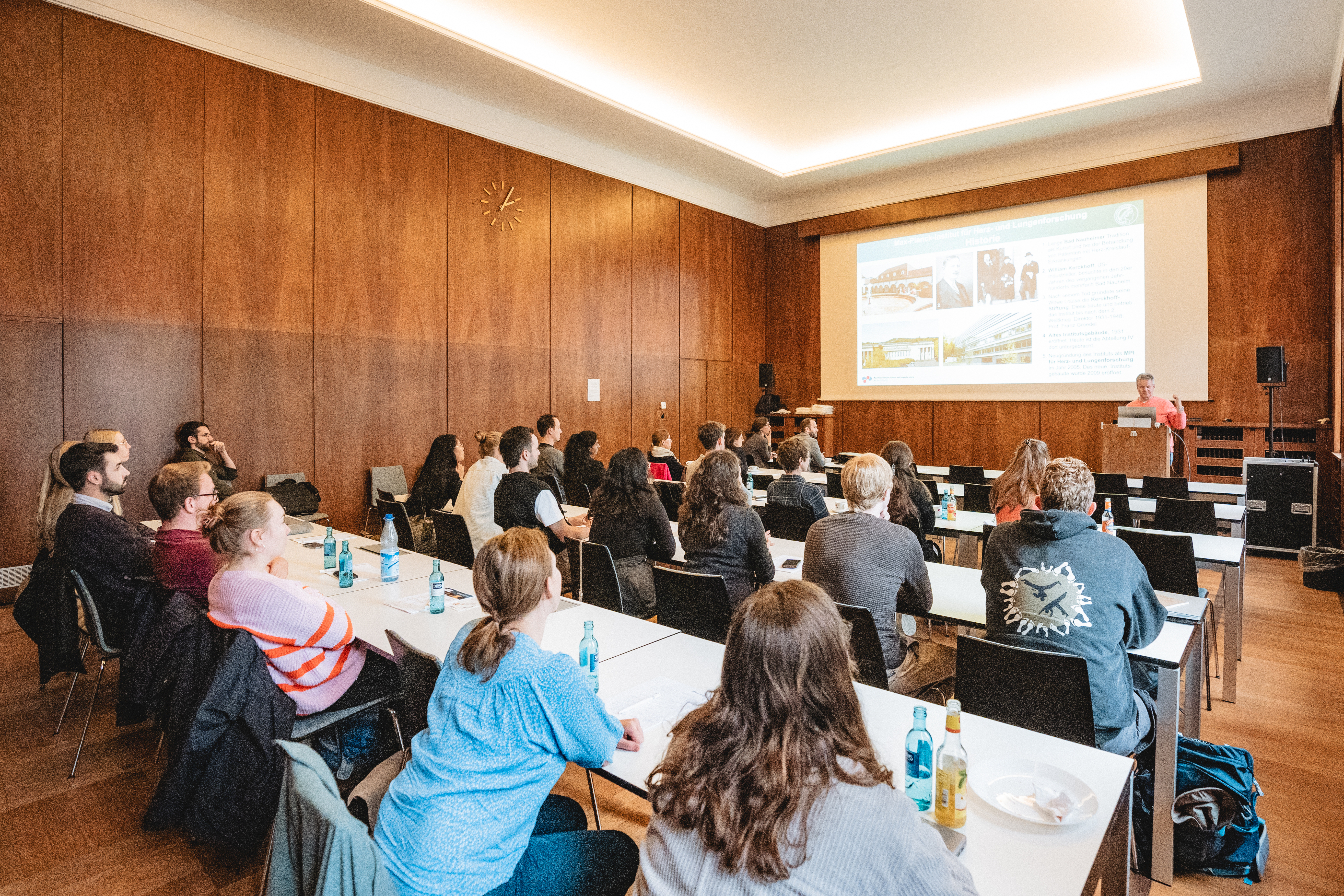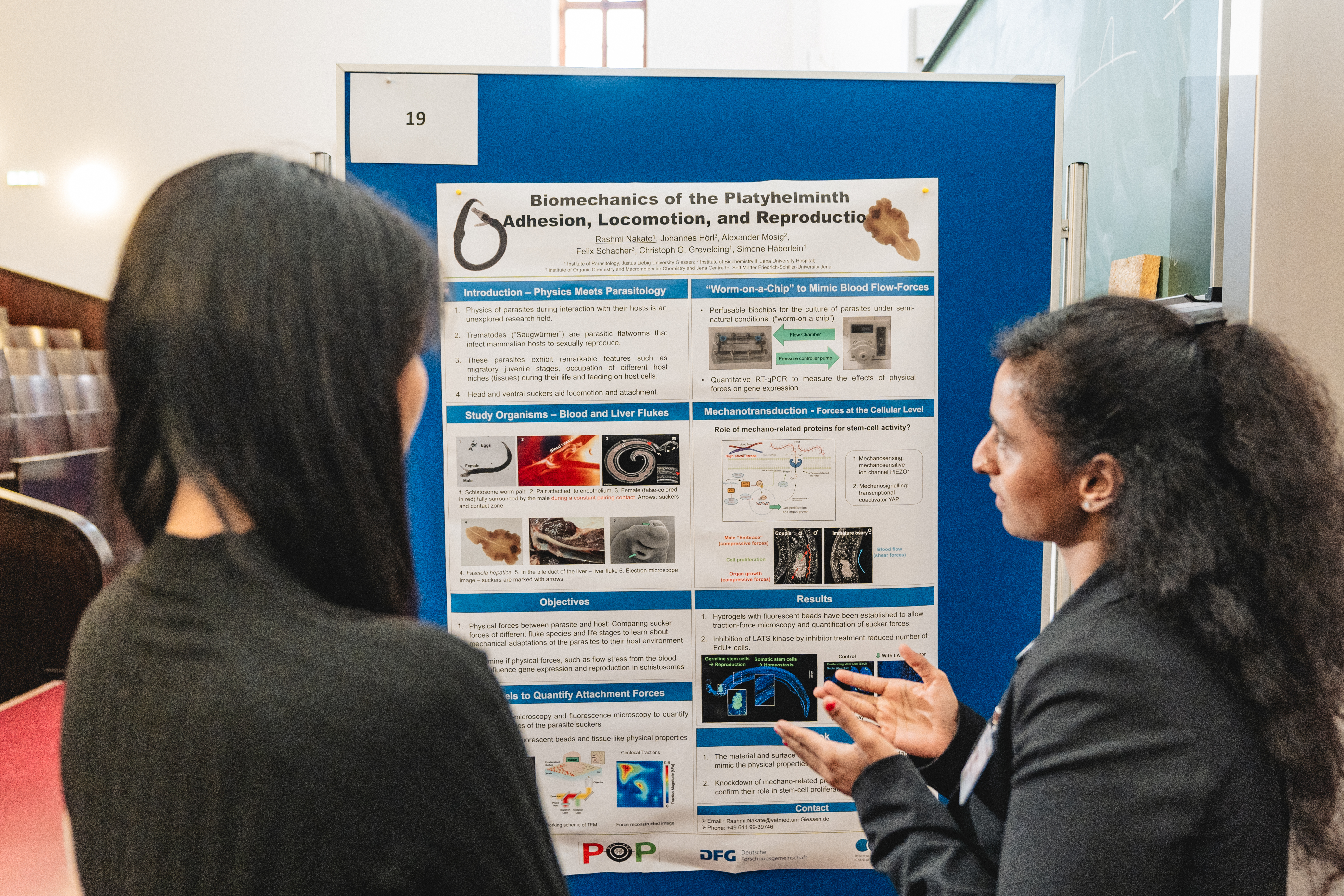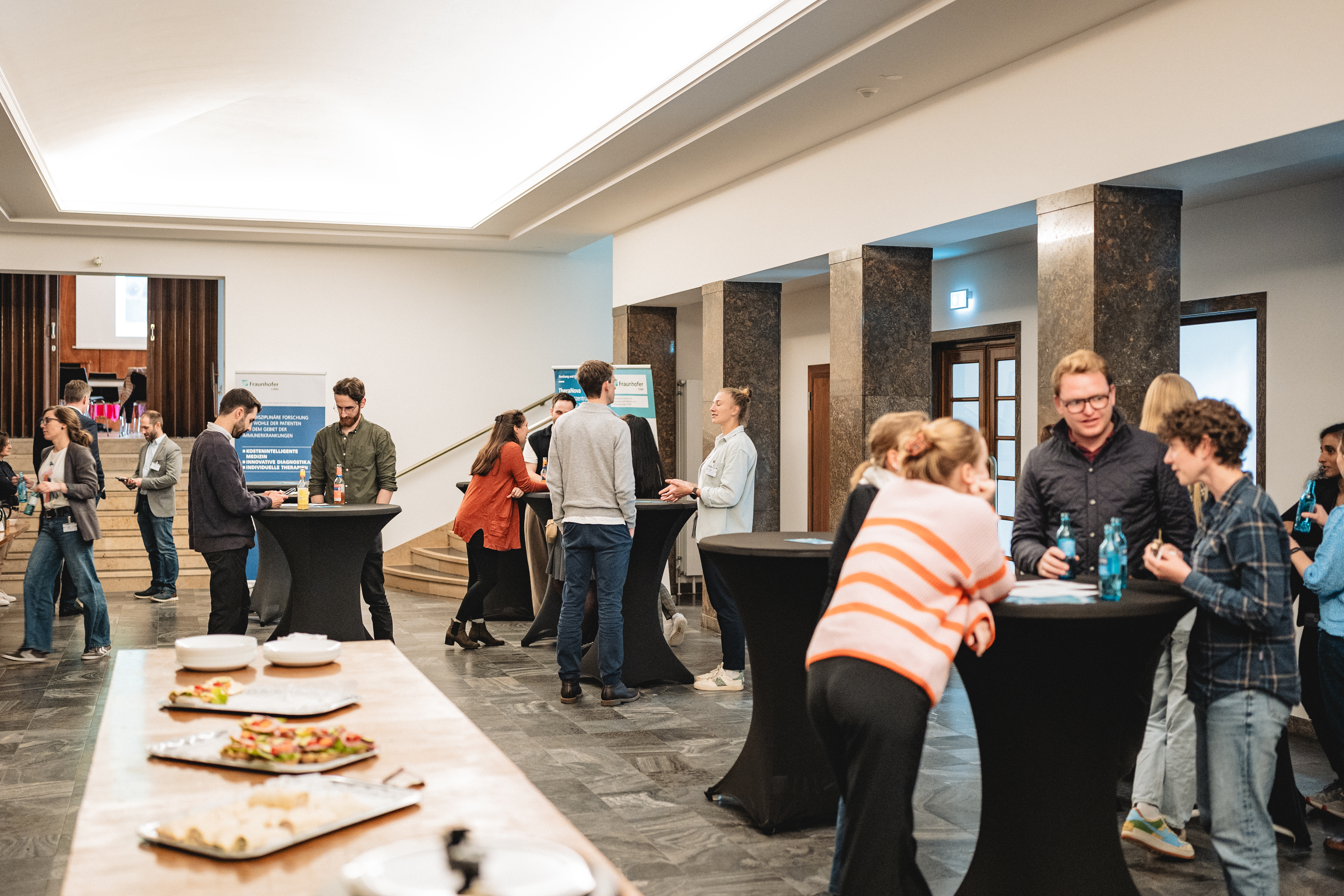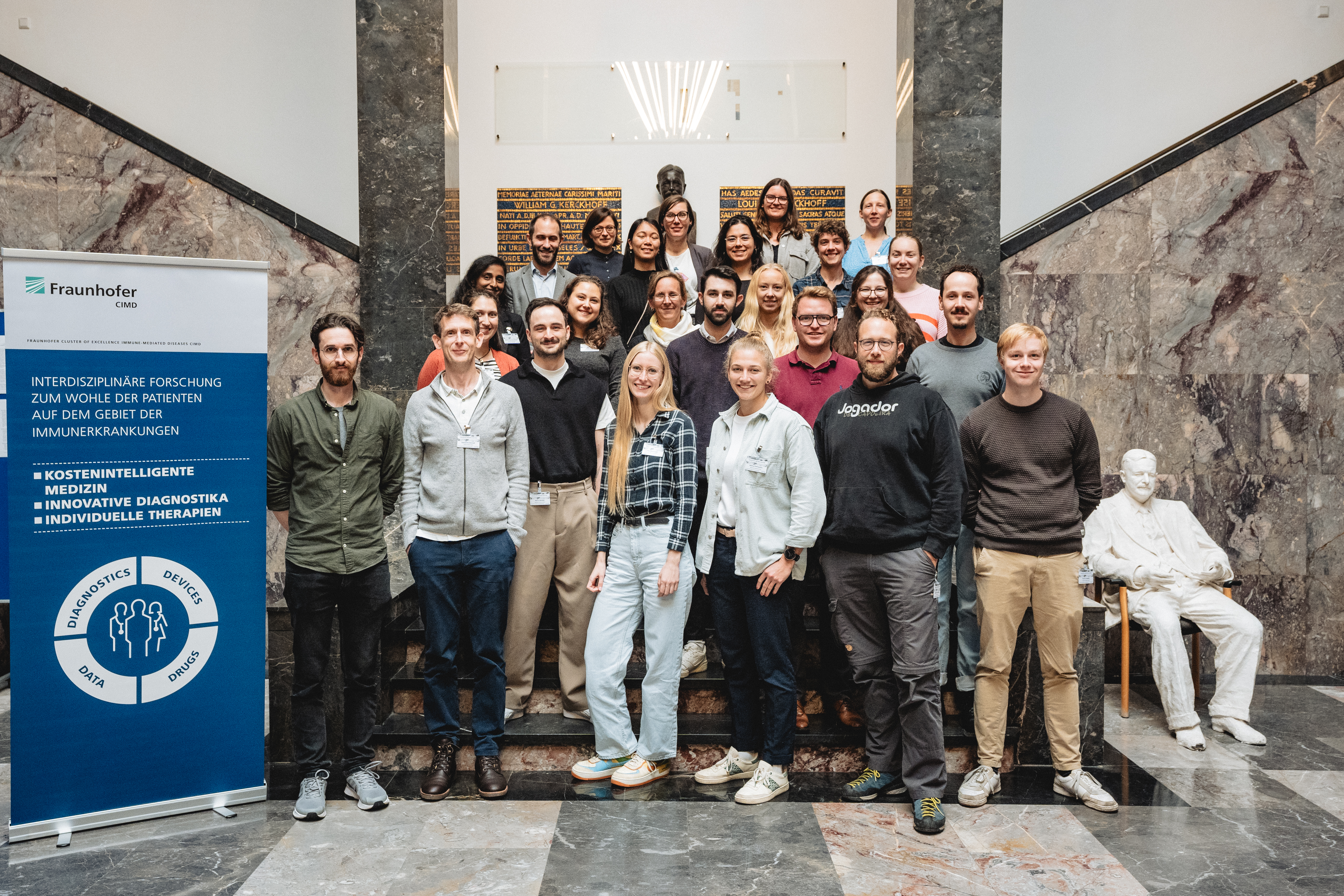Inter- and transdisciplinary training along the 4Ds across institute and institutional boundaries
The Winter School within the Fraunhofer CIMD Young Scientists Program took place in Bad Nauheim from October 09 to 11, 2024.



The three-day Winter School focused on the four major topics of Fraunhofer health research - Devices, Drugs, Data and Diagnostics, the "4D". The participants were doctoral students and young postdocs from research institutes (Fraunhofer Gesellschaft, Max Planck Institute for Heart and Lung Research), the University Hospital Frankfurt am Main, universities (Goethe University Frankfurt, Justus Liebig University Giessen, Hanover Medical School) and the Rheumatology Center Mittelhessen. Over the three days, the participants heard numerous excellent presentations from internal and external experts, pitched their own projects, discussed existing problems and developed ideas in interdisciplinary groups.
Day 1 „Diagnostics und Devices“.
At the beginning of the event, the offices of Fraunhofer CIMD and the High-Performance Center Innovative Therapeutics TheraNova welcomed the participants to the Winter School and briefly introduced the respective research clusters, the goals of promoting young researchers and the individual program items.
This was followed by the first lecture by Prof. Jürgen Schäfer, Head of the Center for Unrecognized and Rare Diseases at Marburg University Hospital. After a brief introduction to the definition and medical need of rare diseases, he gave an overview of routine diagnostic options (imaging, laboratory, genetics) and advanced diagnostics, e.g., via nanopore diagnostics and IT-supported evaluation (Find Zebra). It became clear that rare diseases, apart from the medical need for those affected, offer great potential to better understand conventional diseases (elucidation of signaling pathways and deep phenotyping), to avoid misdiagnosis (awareness of cross-indication symptoms) and to promote interdisciplinarity in healthcare (analysis and interpretation of different disciplines).
The second presentation was given by Maximilian Aretz, Associate in the Frankfurt office of Covington & Burling LLP and member of the "Food, Drug and Device" practice group. The focus was on the new provisions of the Medical Research Act. First, an insight was given into the legal framework for medical research and the location of Germany. The structure of the ethics committees at federal and state level was then explained in more detail, as well as the added value resulting from the planned, consolidated screening of ethics applications. New developments for the Radiation Protection Act were also explained, which will result primarily from considerable time savings (single gate procedure, standardized clauses for clinical trials at federal level).
After a short coffee break, Dr. Conny Blumert, head of the Next-Generation Diagnostics working group at the Fraunhofer IZI, gave a presentation. As an introduction, an overview and background on next-generation sequencing (NGS) and multi-omics methods was given. The potential of multi-omics (e.g., epigenome, proteome, metabolome) was discussed and the development of molecular diagnostics explained, followed by an in-depth summary of classical NGS methods and single-cell RNA sequencing. Finally, an exciting insight was given into spatial transcriptomics and the potential but also the hurdles that await here.
In the following presentation by Marc Kern, co-founder of Implify, an innovative storage system for laboratories was introduced. As an introduction, people behind Implify and their idea were presented: an innovative and efficient storage solution created by a combination of know-how, the need for digitalization and practice-oriented processes. Initially used as a pilot in local dental practices, Implify Connect, an RFID-based storage system for consumables, is now being used throughout Germany and is even being established in Europe. Core function is a central management system that registers the stock of consumables in a fully automated way. After installation and initial set-up, Implify Connect registers the entire amount of consumables stored in a certain environment (i.e. shelf, roll container) and reorders them when they are withdrawn or when there is a defined requirement. This results in considerable time and cost savings, both for the practices and for the manufacturers, who receive orders directly into the system via the Implify Connect system. A clear example of process optimization through digitalization and unbureaucratic implementation.
After a lunch break, including time for exchange and networking, the project pitches were launched for the first half of the participants. This gave them the opportunity to briefly present topics and research from their own area of expertise and to refer to the posters accordingly. The first poster session took place afterwards at the MPI lecture hall. Discussions during the poster session were used to reflect work and approaches, but also offered the opportunity for a lively exchange of ideas.
A career workshop with Sanofi was offered as an excursion after the poster session. Here, Karin Messer (Human Resources), Thomas Kreuzberg (Laboratory Manager) and Leonard Blum (Custom Experience Manager) gave a brief overview of Sanofi and various student and career programs. Thomas and Leo's "live" examples were used to explain the various paths to Sanofi and the different areas of activity, such as laboratory management or Custom Experience, i.e. (global) customer dialog. In this interactive and very vivid round, various experiences and opportunities that can arise after the initially familiar world of studies were demonstrated.
The final lecture was given by Dr. Magdalena Figat, assistant physician at the University Hospital Frankfurt in the field of translational rheumatology, immunology and inflammatory medicine, on the topic of "Psoriasis Arthritis - PsA". The presentation began with an overview of PsA and the special challenges that this immune-mediated disease brings with it. The overlapping of different symptoms, which initially suggest different indications and are therefore also treated by different specialists (dermatology, rheumatology, gastroenterology), clearly show the high medical need for interdisciplinary diagnoses and exchange in order to ensure the earliest possible and targeted therapy. Particular potential was highlighted in preclinical and subclinical PsA, where pathogenesis and lipidomic analyses can play a decisive role.
The day concluded with a guided tour of Bad Nauheim, where participants were able to follow in the footsteps of iconic singers and explore the saline springs and bathhouses of the spa town.
Day 2 „Data”.
This second day of the Winter School began with a presentation by Philipp Herrmann, Fraunhofer IMW Digital Health, focusing on the economic perspective of health data. Using the example of the BMBF-funded joint project Datacare, the fundamental potential of health data but also the initial challenges that arise (who owns health data, who should have access to it, what should/may be done with it) were highlighted. To this end, a survey was conducted among various stakeholders as part of the project and possible ways of dealing with health data (e.g. use, access, compensation) were queried. The secondary use of health data was given special emphasis here, in particular its use to improve the general healthcare system and care.
This was immediately followed by a presentation by Dr. Sebastian Bretthauer, project manager at the Data Protection Research Centre (FSDS) at Goethe University Frankfurt, who gave a deeper insight into the data protection regulation (background, levels of regulation at national and EU level) and highlighted the General Data Protection Regulation (GDPR) in the context of health data. The processing of data (limitations, challenges, powers) and general information on data storage bodies (Research Data Center / Robert Koch Institute) were discussed. Finally, the latest innovations at European level (European Health Data Space) were discussed.
After a short coffee break, Dr. Amy Whitbread, Chief Scientific Officer of the Berlin-based fem-tech start-up theblood, gave a presentation. She addressed the topic of the gender data gap very impressively, i.e., the fact that women and their (medical) data are still vastly underrepresented, which leads to corresponding, essential gaps in (medical) research and care. To counteract this, theblood has specialized as a fem-tech company in the development of menstrual blood tests. Menstrual blood consists of a variety of blood components, such as cellular to stem cells, tissue-specific, including the endometrium. In addition, up to 385 menstrual blood-specific proteins have been found in menstrual blood.The aim is to understand the pathophysiology of women more precisely and thus provide the basis for new types of diagnostics to ensure targeted and improved healthcare for women.
The concluding presentation by Ralf Heyder, Head of External Networking and Strategic Cooperation at Charité and Head of the Coordination Office of the Network of University Medicine (NUM), vividly demonstrated the great need for scientific networking in the German research landscape. In particular, it is important to bear in mind that such structures are existing internationally for a long time and that, under certain circumstances, profit-oriented companies could take on a key role in relation to health data, which would be completely incompatible with non-profit research. The aim of the NUM is therefore to specifically promote infrastructure projects and promote the exchange of research projects, with a focus on application-oriented, multi-center projects. The NUM provides an overarching management structure and thus maintains the independence of the individual research institutions. By establishing platforms for the exchange of clinical data (secondary use) and prospective data (clinical studies), an optimal exchange of health data (imaging, routine, biosamples, omics) is to be ensured.
After the lunch break, Dr. Matthias Heil, Administrative Director of the Max Planck Institute, kindly gave us a short presentation on the origins and history of the MPI, followed by a tour through the MPI. Here, the participants were able to take a brief look at the various areas and laboratories of the Institute of Heart and Lung Research and ask researchers about their work or expand their knowledge in short presentations on different types of imaging (small animal MRI, microscopy).
At the end of the day, the second part of the project pitches took place on site, followed by a discussion and exchange among the participants at the posters.
Day 3 „Drugs“.
On the third and final day of the Winter School, Dr. Aimo Kannt, Head of Drug Discovery at Fraunhofer ITMP, presented various types of innovative therapeutics, some of which are already in use or in clinical trials, in his lecture "New types of drugs". The participants were given an overview of RNA-based drugs (mRNA, siRNA, miRNA), gene therapy (e.g., CRISPR-Cas9) and cell therapy (car-T cells). Case studies and market analyses were also used to illustrate the enormous potential, but also the hurdles in the development and application of these innovative therapeutics. However, the focus remains on personalized medicine tailored to the patient and indication, which, with the help of these promising areas of drug research, holds out the hope of new breakthroughs and improved healthcare.
The coffee break was followed by the final thematic block, in which the participants worked in interdisciplinary groups and discussed and developed specific project challenges, problems and ideas.
A total of four project ideas were developed based on the following research questions:
- How can the gender gap in the health sector be closed? How can drugs and their effects on women be investigated?
- Inflammatory background of rheumatoid arthritis - what leads to flare-ups? How can these be prevented?
- Development of a patch platform - development of a small diagnostic device based on real-time detection of biomarkers.
- Can AI fight cancer? Detection of cancer markers before it breaks out.
Overall, the Winter School was a successful continuation of Fraunhofer CIMD's promotion of young researchers for networking and collaboration among young scientists from a wide range of institutions beyond their current projects and topics. The research cluster would like to thank all speakers for the exciting impulses and the participants for their diverse project insights and active participation.

 Fraunhofer Cluster of Excellence Immune-Mediated Diseases
Fraunhofer Cluster of Excellence Immune-Mediated Diseases